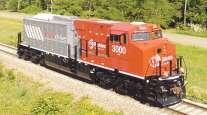Staff Reporter
Pennsylvania Legalizes Gambling at Truck Stops

Pennsylvania Gov. Tom Wolf signed a law Oct. 30 that expands the state’s gaming options by allowing gambling at truck stops, in airports and online.
The bill permits qualifying “truck stop establishments” to house up to five video gaming terminals, or VGTs, and outlines a handful of requirements they must meet in order to do. They include:
• Be equipped with diesel islands used for fueling commercial motor vehicles.
• Have sold on average 50,000 gallons of diesel or biodiesel fuel each month for the previous 12 months or are projected to sell an average of 50,000 gallons of diesel or biodiesel fuel each month for the next 12 months.
• Have at least 20 parking spaces dedicated for commercial motor vehicles.
• Have a convenience store.
• Be situated on a parcel of land of not less than 3 acres that the truck stop establishment owns or leases.
• Not be located on any property owned by the Pennsylvania Turnpike.

Gov. Tom Wolf signed the gaming bill Oct. 30. (Gov. Tom Wolf/Flickr)
Jason Nordin, chief operator of Pilot Flying J, stated that his company will cooperate with Pennsylvania legislators as they start to enforce the new law.
“As the largest operator of travel centers in North America, with 18 locations in Pennsylvania, we plan to work with the state to bring additional offerings to our guests while on the road,” Nordin said. “Timing for these installations will be dependent on the state requirements under this new legislation.”
Pilot Flying J operates 750 travel centers in 43 states.
The law’s requirement that a truck stop have at least 20 parking spaces for commercial vehicles is notable, as there is some question about whether the gaming terminals could increase congestion at the facilities.
Gambling in truck stops has been legal in Montana since the late 1980s, according to Barry Stang, executive vice president of the Motor Carriers of Montana. He said the lure of VGTs did not make parking at that state’s truck stops any worse.

Stang
“We have not found that it has exacerbated the parking problem; in fact most of the truck stops in Montana have very large parking areas that used to be empty and now, with the newer [hours-of-service] rules and [electronic logging devices], many seek those areas,” Stang said. “If anything has exacerbated the problem it is the closing of truck parking and rest areas in the state.”
In Pennsylvania, a Pilot Flying J spokesman said the new bill is not expected to worsen congestion at truck stops. In 2016, the company added more than 1,300 new parking spaces at various locations and also uses Prime Parking, a tool that allows drivers to reserve parking spaces at more than 300 locations. All of the company’s Pennsylvania-based locations meet the requirements to host VGTs.
“We do not foresee any increase in truck parking congestion due to the new gaming terminal legislation at our locations,” the spokesman said. “Parking continues to be a top concern for the trucking industry and professional drivers deserve the comfort and convenience of knowing when and where they are able to park. Pilot Flying J continues to invest in our parking footprint and is focused on increasing the overall number of spaces we have for professional drivers.”
ATRI report says truck drivers sacrifice an hour of driving time for parking https://t.co/50UDv5dpQU — NATSO, Inc. (@NATSO_Inc) May 24, 2017
Parking is an important issue for the trucking industry. The American Transportation Research Institute ranked truck parking No. 4 on its list of most critical issues for the industry, which was released Oct. 23.
Kevin Stewart, president of the Pennsylvania Motor Truck Association, said the group does not have a comment on the state’s new gaming bill.
Pennsylvania’s gross casino gaming revenue was $3.213 billion in 2016, according to the American Gaming Association, second only to Nevada, which had a gross casino gaming revenue of $11.257 billion in 2016.
The bill also legalizes online gambling, making Pennsylvania the fourth state to permit such activity. Online gambling is already legal in Nevada, New Jersey and Delaware.
Richard McGarvey, spokesman for the Pennsylvania Gaming Control Board, McGarvey said work is underway with legislators, truck stops and gaming manufacturers to put the bill in motion.
“We, as a regulator, will start to work through the process of getting the program up and running,” McGarvey said. “We’re still going through everything and we’ll start to make our way through the process of getting these in truck stops. It was a big piece of legislation.”




